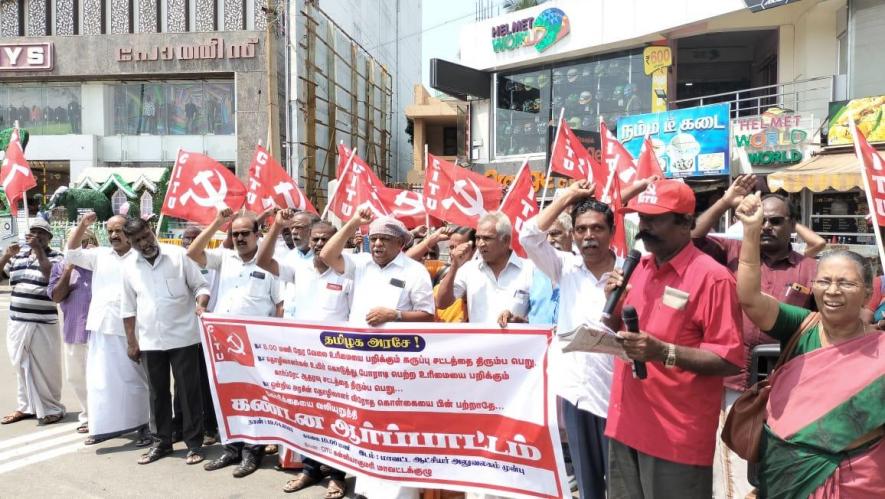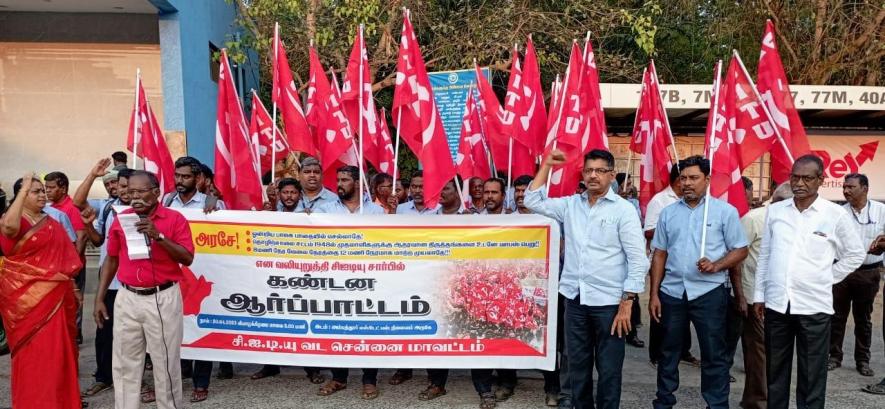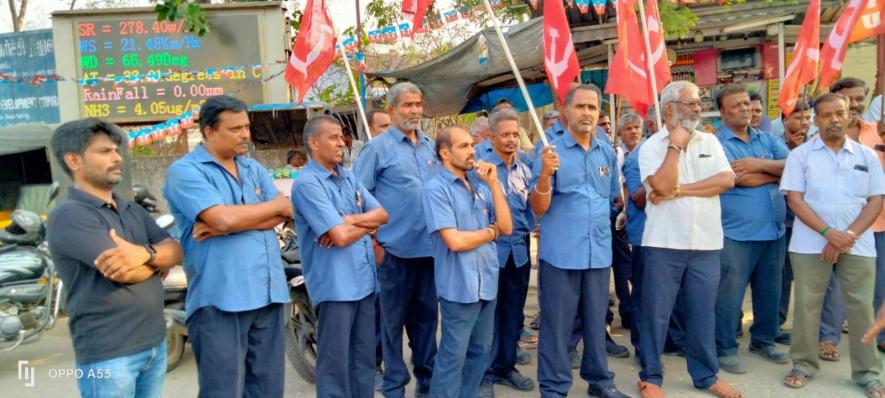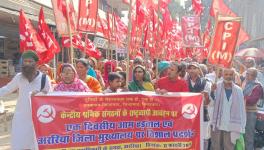Amidst Strong Opposition, Tamil Nadu Withholds Factories Act

Protest held in Kanyakumari. Image courtesy: CITU, Tamil Nadu
Ahead of the meeting with alliance parties, scheduled for April 24 late evening, Tamil Nadu chief minister MK Stalin put the Factories Act on hold. He tweeted, saying the implementation of the Act is presently being withheld.
Earlier in the day, trade union representatives met respective ministers and demanded to withdraw the amendments. The demand was not accepted.
Trade unions strongly condemned the government’s decision to extend the daily work hours from eight to twelve hours in private companies. It was passed in the state Assembly on April 21, the final day of the recently concluded session.
CITU (Centre of Indian Trade Unions), AITUC (All India Trade Union Congress), HMS (Hind Mazdoor Sabha), INTUC (Indian National Trade Union Congress) and other unions have given a call for strike on May 12, demanding the withdrawal of the Factories Act 2023. The amendment was made without consultation with trade unions. Even DMK’s (Dravida Munnetra Kazhagam) trade union, Labour Progressive Front, has demanded a rollback of the Bill.
Some spontaneous protests were witnessed in various parts of the state since the amendments were proposed last week.
DMK ALLIES OPPOSE MOVE
The bill was tabled by state labour minister CV Ganesan. It was passed despite strong opposition from political parties, including the allies like CPI (Communist Party of India), CPIM (Communist Party of India (Marxist)), Congress, MDMK (Marumalarchi Dravida Munnetra Kazhagam) and the VCK (Viduthalai Chiruthaigal Katchi).
BJP (Bharatiya Janata Party) called for a review of the Bill. The main opposition party, AIADMK (All India Anna Dravida Munnetra Kazhagam), members were not in the Assembly, having walked out earlier in the day.
However, AIADMK general secretary Edappadi K Palaniswami gave a statement opposing the amendment on Saturday. Similarly, PMK said the move would result in a loss to the working force in the state.

Protest held in north Chennai. Image courtesy: CITU, Tamil Nadu
"Eight-hour working-day was won after a struggle of 150 years. Many people sacrificed their lives; many lost their jobs, and others lost their families and went to prison. This is not a fight we can afford to lose," said CPI(M) Tamil Nadu secretary K Balakrishnan.
"By increasing the eight-hour working day to 12 hours, the Act would legalise labour exploitation by factories," said MDMK leader Vaiko.
"Creating a situation where employees work for more hours for more wages is a human rights violation," said Veeramani, general secretary of Dravidar Kazhagam. Dravida Iyakka Thamizh Peravai, general secretary of the SuPa Veerapandian, asked the DMK not to implement such a law in its rule and "needless to say, it will only lead to exploitation of labour".
DMK'S DOUBLE STANDARDS
Trade unions have pint-pointed the hypocrisies of the DMK by making amendments to the Factories Act.
CITU, Tamil Nadu observed that the DMK outrightly opposed the BJP-ruled states and the union government when they overstepped the labour laws. Still, the Tamil Nadu government has moved in the same direction.
When BJP-ruled Madhya Pradesh and Uttar Pradesh decided to stay labour laws for three years, and Gujarat increased working hours to 12 hours, Stalin opposed them, terming them 'anti-labour.'
In 2019, the Union government passed four labour codes, and many political parties, including the DMK, opposed them. Even four years after the bill's passage, it has yet to be implemented in many states. Trade unions criticised the DMK government for taking the codes as a precedent and making amendments to the Factories Act.

Protest held by SICDO workers in Coimbatore. Image courtesy: CITU, Tamil Nadu
“This move is not only anti-employee but also violates the principles of social justice and democracy,” said Alagunambi Welkin, General Secretary of the Union of IT and ITES Employees.
The DMK has claimed to be a votary of social justice and democracy. The All India Social Justice Forum was floated by Stalin in February 2022 as an initiative to build a united opposition against bigotry and religious hegemony.
The trade unions have been demanding a reduction in work hours from the existing eight hours to six hours.
“A shorter workday can lead to increased job satisfaction, improved mental health, and better work-life balance. This, in turn, can lead to increased productivity and better quality work, benefiting both employees and employers,” said Welkin.
Workers all over the world fought for eight hours of work. In 1917, the Soviet Union enforced the eight-hour of work per day rule. In 1919, the International Labor Organisation declared the same, and India adopted it under British rule.
Get the latest reports & analysis with people's perspective on Protests, movements & deep analytical videos, discussions of the current affairs in your Telegram app. Subscribe to NewsClick's Telegram channel & get Real-Time updates on stories, as they get published on our website.
























